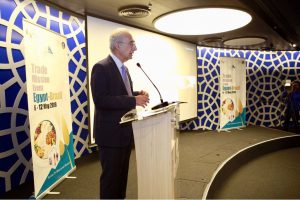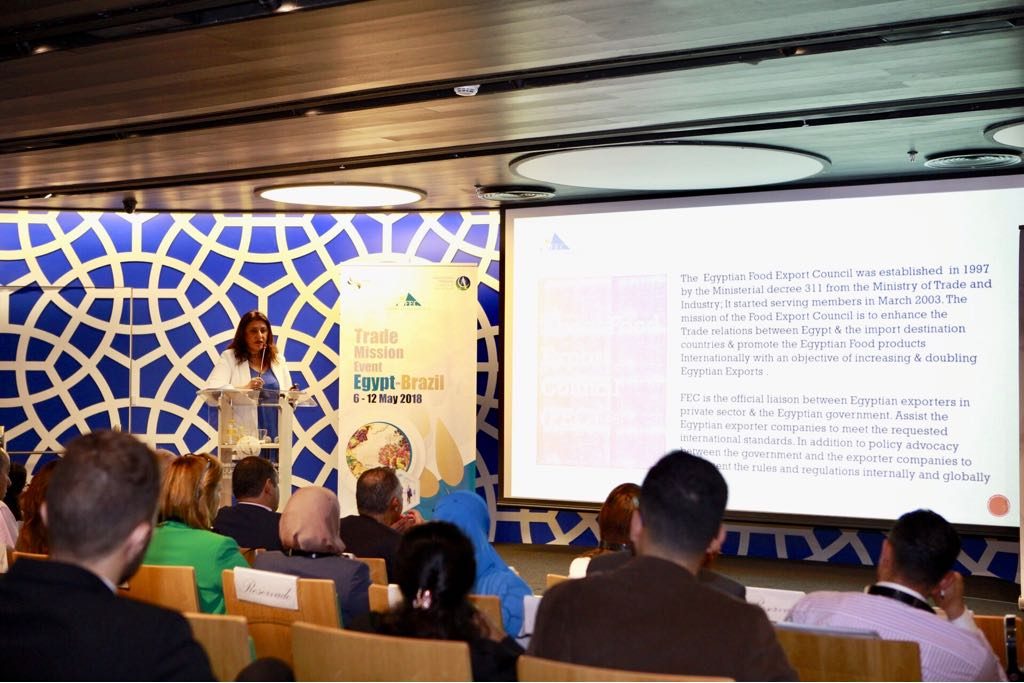São Paulo – Egypt exported USD 26.3 million worth of processed foods to Mercosur countries last year. The country’s potential as a food supplier was discussed this Thursday (10) in the Brazil-Egypt Business Meeting, which saw Brazilian and Egyptian executives get together at the Arab Brazilian Chamber of Commerce in São Paulo.
The executive director with Egypt’s Food Export Council (FEC), Manar Nasr, said Egypt shipped some USD 21 billion in goods abroad last year, with food industry-related products accounting for 13% of that, at USD 2.8 billion.

The meeting hosted by the Arab Chamber in partnership with the FEC is part of a drive to increase sales from Egypt to Brazil. Brazil-Egypt trade got a boost with the entry into force of the Mercosur-Egypt free trade agreement last year, which provides for import tax breaks and exemption on a number of items.
During her address at the Chamber, Nasr mentioned which are currently the top-selling processed food items from Egypt to the Mercosur. Pickled olives led sales last year at USD 15 million, followed by baking powder at USD 2.9 million, fruits and seeds at USD 2.8 million, vegetable preparations at USD 2.6 million, dried onions at USD 1.2 million and dried vegetables at USD 500,000.

Processed food exports from Egypt to Mercosur countries were up 26% in 2017 from 2016, Nasr said. Egyptian companies are currently in Brazil working to best those numbers. They are exhibiting in the São Paulo Supermarkets Association’s APAS Show, at a stand organized by the Arab Chamber. Following a seminar this Thursday, they sat down for B2B sessions with Brazilian importers.
Egypt food products run the gamut from vegetables, cheese and sugar, which sell the most, to pastries, dairy, juices, poultry, fish, fruit, herbs, condiments, essential oils, etc. The goods get shipped to Arab countries, African countries, the United States and Europe.
“We have a very promising market here, and we can work on it during this trip,” Nasr said. She also showed a video on Egypt’s date production, which the companies in the delegation are offering.

Arab Chamber president Rubens Hannun opened the event and went over the importance of two-way Brazil-Egypt trade. Hannun said he was pleased to see Brazil and Egypt take a step further with the Brazil-Egypt Business Meeting and the Egyptian delegation’s trip to Brazil.
Egypt’s ambassador to Brazil, Alaa Roushdy, addressed the audience and said he believes in the potential of food sales from his country. “Brazil is a major food producing country, so this isn’t easy, but considering the quality that many of our products have, I don’t see why trade cannot increase,” he stated during the event at the Arab Chamber.
Executives in attendance also learned more about technical aspects of importing food to Brazil, in a lecture from the director of the Brazilian Ministry of Agriculture, Livestock and Supply’s Vegetable Products Inspection Department Fábio Florêncio Fernandes. He covered the steps required in order for imported foods and beverages to be sold in Brazil.
Fernandes said processes are being automated to streamline paperwork requirements in food and beverage imports and exports and the rating of imported goods. Fernandes also heard requests from the audience regarding garlic, grape and orange imports from the Arab world.

After the lecture, Brazilian executives joined an Egyptian food tasting session and had meetings with the Egyptian exporters. Sandra Braz, the owner of foreign trade company Brazil Spice, was there to get in touch with the Arab executives and look into importation possibilities. She was also representing import-export companies Golden Spices and Santos Flora.
Abramino Schinazi, the owner of Sama Brasil, came to the B2B sessions looking to import olives from Egypt. Sama connects importers and exporters and handles all logistical aspects of trade. According to Schinazi, a client of his who currently buys olives from Argentina is interested in the Egyptian product.

The Brazil-Egypt Business Meeting held this Thursday was one of several activities carried out by the Arab Chamber to fuel trade between those countries, in light of the Mercosur-Egypt free trade agreement. Another such action was a seminar on the agreement, held last month and featuring officials from Egypt’s Ministry of Trade and Industry, with which the FEC is affiliated.
Mercosur-Egypt relations – and specifically Brazil-Egypt ones – were also addressed at the Brazil-Arab Countries Economic Forum, held by the Arab Chamber last April in São Paulo. The Arab Chamber also worked for the agreement to come to fruition, which finally happened late last year.
Today’s meeting was attended by authorities including Egypt’s commercial consul to São Paulo, Mohamed ElKhatib, Jordan ambassador to Brazil Malek Twal, and Arab Chamber C-level executives including CEO Michel Alaby, International Relations vice president Osmar Chohfi, and board members Willian Atui and Mohamad Orra Mourad.
Watch FEC executive director Manar Nasr speak at the Brazil-Egypt Business Meeting:
Translated by Gabriel Pomerancblum




